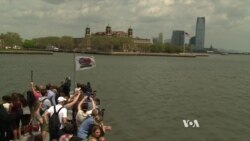Ellis Island in New York Harbor is a major tourist attraction in the area, second only to the Statue of Liberty. Some people come to the island to find information about their ancestors and to understand why they left their homes behind.
But there was plenty of immigration to the U.S. before Ellis Island opened and after it was closed. It's being highlighted in a new exhibit at Ellis Island called “The Peopling of America.”
“A lot of people were coming here and saying, 'Look, there’s nothing here for me. My story isn’t told here. Either I came early or, more likely, I’ve come recently, and you say nothing about me,' " said Stephen Briganti, president and CEO of the Statue of Liberty-Ellis Island Foundation. So the exhibit was developed because "one, we wanted to remain relevant, and two, we believe it was the right thing to tell the story, entire story, and this was the right place to do it.”
The exhibit highlights the first days of American exploration and colonization and the conflicts with native Americans. And while most people came as free men, the exhibit does not shy away from the country's history of slavery and indentured servitude, said Clay Gish, exhibit content designer.
“We had to deal with slavery," Gish said. "Some people were brought here against their will, but still they experienced their journey. They ended up having to adapt to this new land.”
The major part of this $20 million upgrade tackles the years after 1954, when immigrants came to the U.S. legally and illegally by plane, foot, homemade rafts and ships. The individual stories are told "through specific interviews with real immigrants and their experience in making the trip," said Michael Schneider, who designed the technology and media.
The exhibit reflects the changing face of immigration and the changing sentiments. Visitor Rita McGregor of Santa Fe, New Mexico, said she found it "very interesting we were so receptive to immigrants a century ago and now we do not treat them the same.”
CEO Briganti called immigration part of America’s DNA. He said we sometimes make it tough, but we're still unquestionably a nation of immigrants.





